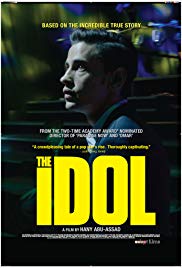
THE IDOL
Palestine, 2015, 100 minutes, Colour.
Tawfeek Barhom, Kais Attalah.
Directed by Hany Abu -Assad.
The Idol is based on a true story, the history of Mohammed Assaf, a little boy seen in Gaza in 2005, playing with his friends, with his tomboy sister, his parents trying to keep an eye on them and their discipline – but his having a strong singing voice which the children capitalise on in raising money by singing in the streets, and then, when his sister has kidney disease, singing at various weddings and functions to raise money for her surgery.
The young boy, Kais Attalah, plays Mohammed in a very sympathetic way. He is less sympathetic when he grows older, is studying at the University but driving a taxi to raise funds. He still sings, but is an angry young man, falls out with the sympathetic coach who helped him when he was young, wants to give up singing.
An encounter with a young woman, a childhood friend of his sister when they both had kidney treatment, is a passenger in his taxi, encourages him to sing – and he makes the decision then to try for Arab Idol. He practices, reconciles with his coach, gets the support of his parents. Actual elements from his story include his getting a forged passport, smuggling himself into Egypt to go to Cairo for auditions for the show, his being too late to get a ticket, his getting a ticket from a Palestinian young man who hears him singing. He impresses the producers, goes through the auditions, goes for the various weeks of the program including filming in Beirut. He is nervous, is in contact with his family, has a panic attack, but is encouraged by the young woman and her faith in him – and he goes on to win the program.
With the announcing of the winner, the film makes a transition to the actual sequences with Mohammed Assaf – with a great deal of footage of the enthusiasm of the people of Gaza and Palestine celebrating the win and Mohammed giving international voice to their situation.
1. The true story? 21st-century story? Palestinian story? In the context of the Israeli occupation? The Arab world, Gaza, Palestine, Egypt, Lebanon?
2. The atmosphere of Gaza, the initial chase of the children and racing through all the areas of Gaza city, streets, homes, buildings, vehicles, touches of prosperity, touches of oppression? The later sequences in Gaza, the streets and the ruined buildings? The border with Egypt, the tunnels, passport control? Egypt, Cairo, the lavish buildings, the auditorium? Beirut?
3. The title, popular television shows of the 21st-century, the various local Idol programs, the wide audiences, the national feeling, the glitzy style?
4. The music, Arabic songs, rhythms, lyrics, particularly distinctive?
5. The two parts of the film, the focus on Mohammed as a boy, as a teenager? The two actors and their performances?
6. Mohammed and his friends, little boys, up to mischief, playing together, Nour and her presence, the tomboy? The mother and her strictness, discipline? The role of the father?
7. Mohammed, his ability to sing, Nour and her promotion, the friends and their playing instruments? Saving the money, going to the smuggler, his promise to get the instruments, their going back, his going back on his word, bashing Mohammed? Mohammed later going to see him to get the forged passport? The role of smugglers in Palestine?
8. Singing in the street, collecting the money, the boys going on the barrels to collect the fish and selling them, pursuing the man who didn’t pay?
9. Nour, her illness, dialysis, the need for a kidney, Mohammed not compatible? Trying to raise the money, singing at functions, weddings, the many scenes of performance, the audience dancing? Mohammed and his wanting to get the money from the entrepreneur?
10. The music coach, the brass instruments, his listening to Mohammed, training him, for many years? Mohammed older, his resentments, walking out on the coach?
11. Mohammed at the University, driving the taxi, the encounter with the young girl with her kidney problems, memories of the past and his sister? Her praising his voice, asking him to sing in the taxi? Seeing her going to the hospital? His decision to go back on his word, on his animosity toward singing and the coach?
12. Discussions with his parents, their ultimate support? Going back to the coach, his encouragement, singing with passion?
13. His boyhood friend, going to the strict interpretation of Islam, that singing was immoral, his giving information and the military arrest of the musicians? Mohammed getting the passport, going to the border, hiding, the back of the truck, getting into passport control, singing and the officer letting him through, the encounter with his friend and the appeal, his being allowed into Egypt?
14. Lining up, not having a ticket, climbing into the building on the upper floors? Singing in the toilet, the encounter with the Palestinian young man, getting the ticket, his support?
15. The various auditions and performances? The effect on Mohammed? Phone calls home? Accepted on the show? The many sequences of celebration in Gaza? The political significance, for Palestinians, for Israel? For an Arab voice to be heard?
16. Continued success, going to Lebanon? His nerves, the panic attack, the hospital? The support of the judges and producers, their faith in him?
17. His performances, television? Waiting for the announcement of the winner?
18. The transition to sequences with the actual Mohammed, his win, acceptance, the consequences?
19. A morale-boosting Palestinian film, the importance of popular music, of the widespread influence of television, people united for the talent television quests?